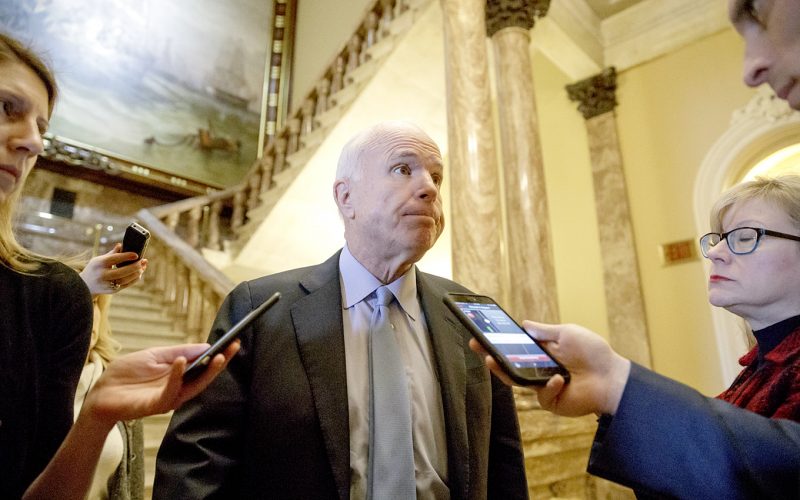
Senate Armed Services Committee Chairman Sen. John McCain, R-Ariz. responds to reporters’ questions about critical comments from President Donald Trump, Thursday, Feb. 9, 2017, on Capitol Hill in Washington. President Donald Trump is going after McCain in a series of Twitter messages for suggesting that last week’s U.S. raid in Yemen wasn’t a success. (AP Photo/J. Scott Applewhite)
Vice President Mike Pence and Secretary of Defense James Mattis went to the Munich Security Conference with reassurances about the US commitment to NATO. However, their visit was anything but reassuring. They said nothing about the European Union nor Brexit, seemed to condition US support of NATO on the Europeans paying more of the bills, and took no questions after their boilerplate speeches. Europeans at the event were quoted as feeling anything but reassured. In fact, some thought the US commitment to Europe was lessened by the Americans’ speeches, which had nothing to offer about Russia, Ukraine, or European unity in general.
The most meaningful comments from the US side were made by Sen. John McCain. He spoke forcefully in defense of Western values, said the administration was “in disarray,” suggested (without mentioning Trump or Stephen Bannon) that certain people were “flirting with authoritarianism and romanticizing it as our moral equivalent,” and defended a free and probing press against Trump’s outrageous attacks on “an enemy of the people.” Europeans were left in no doubt who could be counted on their side and whose support was in grave doubt.
Out of the blue came another thunderbolt: a report that two Trump cronies—his personal attorney, the subject of the ongoing FBI investigation of Trump associates’ activities in Russia during the presidential campaign, and a Russian-American businessman who worked on real estate deals with Trump, including one in Moscow—and an obviously ambitious Ukrainian man had engaged in “private” diplomacy designed to “solve” the war there. All three have shady pasts. The three presented their plan to Gen. Michael Flynn, but denied it made it to Trump’s desk. In essence, the plan would put the Ukrainian in the presidential chair and, presumably, lead to a new deal with Russia that would end the war.
“Disarray”? McCain’s characterization is much too charitable. With Trump too busy attacking his critics and Stephen Bannon evidently in charge, the administration is incapable of developing a coherent foreign policy supportive of traditional allies. It is much better at pushing the Trump brand than at promoting the national interest. Trump, Bannon, et al. have abandoned the State Department and the intelligence services in order to pursue their reckless objectives without interference.
Mel Gurtov, syndicated by PeaceVoice, is Professor Emeritus of Political Science at Portland State University. The opinions expressed in this article are those of the author and do not necessarily reflect the views of The Free Weekly or its staff.



